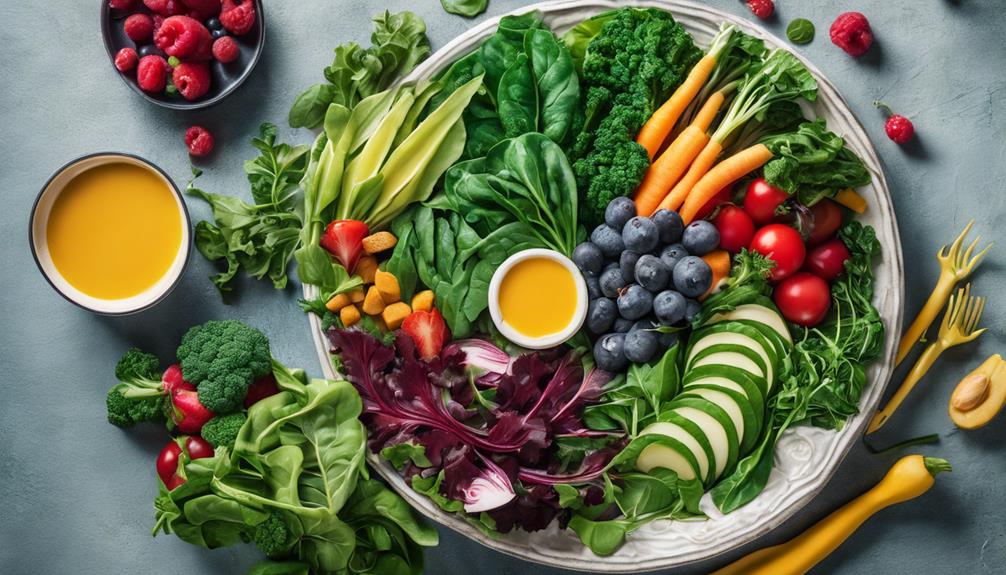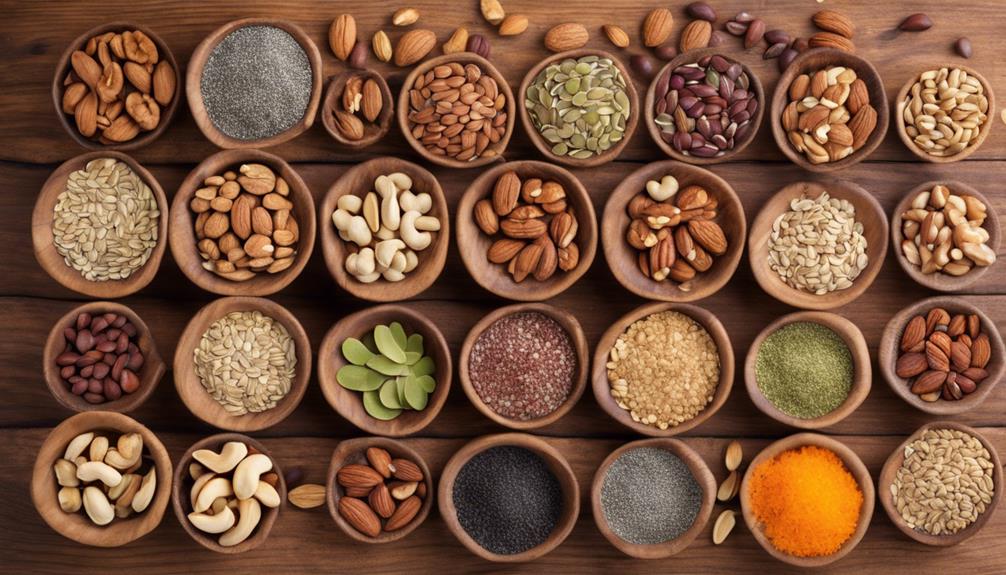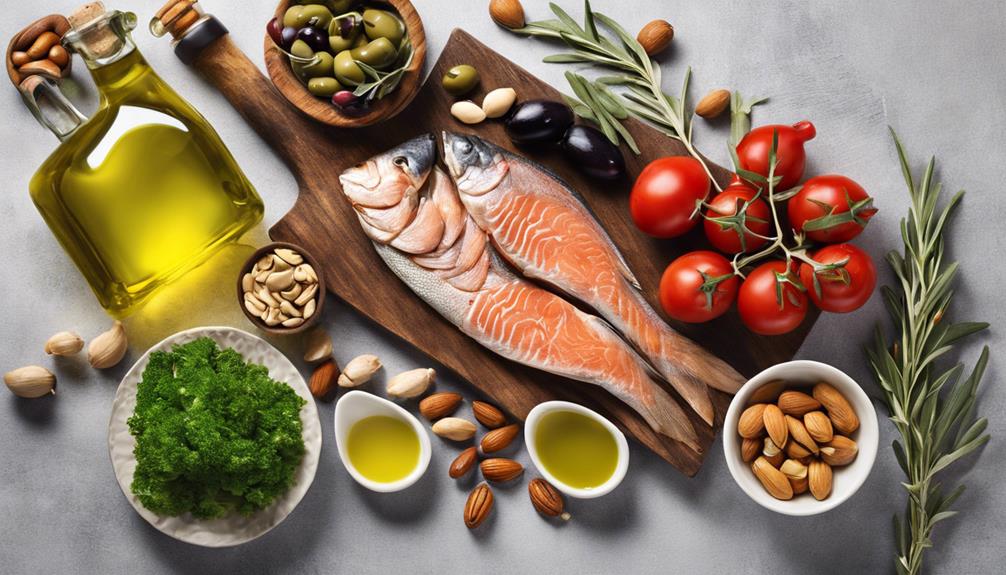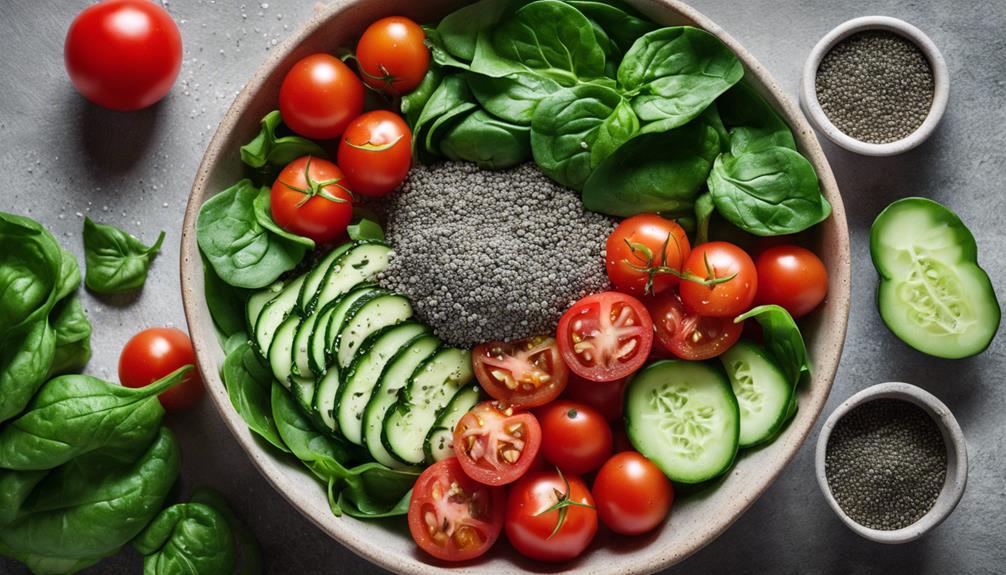Top Foods for Reducing Inflammation
Imagine incorporating a daily snack of mixed berries into your routine could significantly reduce inflammation in your body. But what other foods could you add to your diet to boost this anti-inflammatory effect even more? By exploring the benefits of fatty fish, leafy greens, turmeric, nuts, seeds, tomatoes, green tea, dark chocolate, and probiotics, you might uncover a plethora of delicious options that not only taste good but also support your overall well-being.
Key Takeaways
- Berries like blueberries and strawberries contain anti-inflammatory anthocyanins and high levels of vitamin C.
- Fatty fish such as salmon and mackerel are rich in omega-3s that reduce inflammation.
- Leafy greens like spinach and kale provide nutrients and antioxidants that combat inflammation.
- Turmeric, with curcumin, offers anti-inflammatory benefits and is easy to incorporate into meals.
- Nuts and seeds, high in omega-3s and antioxidants, help combat inflammation and promote health.
Berries
When it comes to reducing inflammation, incorporating berries into your diet can be a beneficial choice. Berries are an antioxidant powerhouse, containing compounds that can help combat oxidative stress in the body. These fruits, such as blueberries, strawberries, and raspberries, are rich in vitamins, minerals, and phytochemicals that possess anti-inflammatory properties.
Anthocyanins, a type of flavonoid found abundantly in berries, have been shown to reduce inflammation by inhibiting certain inflammatory markers in the body.
Additionally, the high levels of vitamin C in berries can also contribute to their anti-inflammatory effects by scavenging free radicals and reducing oxidative damage.
Including a variety of berries in your daily meals, whether as a snack, in smoothies, or as a topping for yogurt or oatmeal, can be a delicious and effective way to harness their anti-inflammatory benefits.
Fatty Fish
Incorporating fatty fish into your diet can provide numerous health benefits, particularly in reducing inflammation. Fatty fish such as salmon, mackerel, and sardines are rich sources of omega-3 fatty acids, which have been extensively studied for their anti-inflammatory properties. Omega-3 benefits include reducing levels of inflammatory markers in the body, which can help in managing conditions like arthritis, heart disease, and even certain types of cancer.
Research suggests that the consumption of fatty fish can lead to a decrease in inflammation, thereby lowering the risk of chronic diseases. The omega-3 fatty acids found in these fish play a crucial role in regulating the body's inflammatory responses, promoting overall health and well-being.
Including fatty fish in your diet a few times a week can be a delicious way to reap the benefits of omega-3s and work towards reducing inflammation in your body.
Whether grilled, baked, or even in a salad, make room for these nutritious options on your plate to support your health and well-being.
Leafy Greens
Leafy greens are a powerhouse of nutrients that can play a significant role in reducing inflammation in your body. These vibrant greens, such as spinach, kale, and Swiss chard, are packed with vitamins, minerals, and antioxidants that have been shown to combat inflammation. Their high nutrient density makes them an excellent addition to your diet for overall health and well-being.
Incorporating leafy greens into your meals is easy and delicious. You can try adding them to your morning smoothie, tossing them into salads, or sautéing them with garlic and olive oil as a side dish.
For a nutrient-packed meal, consider making a colorful salad with a mix of leafy greens, topped with grilled salmon or chicken for added protein and anti-inflammatory benefits.
Turmeric
Turmeric, a golden spice commonly used in cooking and traditional medicine, has gained popularity for its potential anti-inflammatory properties. This powerful spice contains curcumin, a compound known for its various health benefits. Curcumin has been shown to reduce inflammation in the body, which can help alleviate symptoms of conditions like arthritis.
In addition to its health benefits, turmeric is a versatile spice that can be easily incorporated into your daily meals. You can sprinkle it on roasted vegetables, add it to soups and stews, or even mix it into smoothies for an extra anti-inflammatory boost.
The warm, earthy flavor of turmeric pairs well with a wide range of dishes, making it a popular choice in many cuisines around the world.
Next time you're in the kitchen, consider adding a dash of turmeric to your recipes to not only enhance the flavor but also reap its potential anti-inflammatory benefits.
Nuts and Seeds
Rich in essential nutrients and healthy fats, nuts and seeds are known for their potential anti-inflammatory properties. These powerhouse foods offer a wide array of nutritional benefits. Packed with omega-3 fatty acids, antioxidants, and fiber, they can help combat inflammation in the body.
Nuts and seeds are versatile ingredients that can be easily incorporated into your daily meals. Add a handful of walnuts to your morning yogurt or sprinkle chia seeds on top of your salad for an extra health boost.
You can also try using almond flour in baking as a gluten-free alternative that adds a delightful nutty flavor to your favorite treats.
In addition to their nutritional benefits, nuts and seeds have various culinary uses. They can be enjoyed as snacks on their own, added to trail mixes, or used as toppings for oatmeal, smoothie bowls, or even stir-fries. By incorporating nuts and seeds into your diet, you not only add delicious flavors but also promote overall well-being through their anti-inflammatory properties.
Avocado
Nuts and seeds aren't the only foods with anti-inflammatory properties worth adding to your diet. Avocado, with its creamy texture and rich flavor, is a versatile fruit that can be incorporated into various dishes to help combat inflammation. Whether you enjoy it in avocado toast, avocado smoothies, avocado salads, or as delicious guacamole, this fruit is packed with nutrients that promote overall health and well-being.
Consider the following table to showcase the different ways you can enjoy avocado:
| Avocado Dish | Description |
|---|---|
| Avocado Toast | Mashed avocado on whole-grain toast, topped with various seasonings or toppings. |
| Avocado Smoothies | Creamy and nutritious smoothies blended with ripe avocado, fruits, and greens. |
| Avocado Salads | Fresh salads featuring avocado slices, mixed with leafy greens, veggies, and protein sources. |
| Avocado Guacamole | A classic dip made from mashed avocados, onions, tomatoes, lime juice, and cilantro. |
Incorporating avocado into your meals not only adds a burst of flavor but also provides essential nutrients that can help reduce inflammation and support your overall health goals.
Olive Oil
Olive oil, a staple in Mediterranean cuisine, is renowned for its numerous health benefits and anti-inflammatory properties. Rich in monounsaturated fats, olive oil is a key component of the Mediterranean diet, known for promoting heart health and reducing inflammation throughout the body. Studies have shown that the antioxidants present in olive oil can help combat oxidative stress, a major contributor to inflammation.
When incorporating olive oil into your diet, opt for extra-virgin olive oil for maximum health benefits, as it undergoes minimal processing and retains more nutrients. Use olive oil in salad dressings, marinades, or drizzle it over cooked vegetables to add a flavorful and healthy touch to your meals.
In addition to its anti-inflammatory properties, olive oil is also linked to improved cholesterol levels, better blood sugar control, and reduced risk of chronic diseases.
Ginger
Renowned for its potent anti-inflammatory properties, ginger is a versatile ingredient that can be a powerful addition to your diet. Ginger benefits include reducing inflammation, aiding digestion, and boosting immunity. This root contains bioactive compounds like gingerol, which have been studied for their potential health benefits. Incorporating ginger into your meals can be easy and delicious.
Try adding freshly grated ginger to stir-fries, soups, or smoothies for a flavorful kick and an anti-inflammatory boost. You can also brew ginger tea by steeping slices of fresh ginger in hot water or combine it with lemon and honey for a soothing drink. Ginger can even be used in baking, adding warmth and depth to cookies, cakes, and bread.
For a refreshing and anti-inflammatory beverage, mix ginger with mint, lemon, and cucumber in water for a revitalizing drink. With its wide range of benefits and versatility in recipes, ginger is a valuable addition to a diet focused on reducing inflammation and promoting overall health.
Tomatoes
Tomatoes, widely recognized for their vibrant color and versatile culinary uses, are more than just a flavorful addition to dishes. Packed with essential nutrients, tomatoes offer a wide array of benefits that can aid in reducing inflammation. These benefits stem from their high content of antioxidants, such as lycopene, vitamin C, and beta-carotene, which help combat oxidative stress in the body. Incorporating tomatoes into your diet can contribute to a healthier inflammatory response within your system.
When it comes to cooking with tomatoes, the possibilities are endless. Whether you enjoy them raw in salads, roasted in soups, or as a base for sauces, tomatoes can enhance the flavor profile of many dishes while providing their anti-inflammatory properties. Try incorporating fresh tomatoes into your meals whenever possible to reap the full benefits they offer.
Remember to choose organic tomatoes when available, as they may contain higher nutrient levels compared to conventionally grown ones.
Green Tea
With their numerous health benefits, green tea stands out as a powerful ally in the fight against inflammation. Green tea is rich in antioxidants, particularly catechins, which have been shown to help reduce inflammation in the body. These antioxidants work by neutralizing free radicals that can lead to inflammation and damage to cells.
Additionally, green tea contains caffeine, which can help boost metabolism and improve focus. The caffeine content in green tea is lower than that in coffee, providing a gentle energy boost without the jitters associated with higher caffeine intake.
Research suggests that the combination of antioxidant benefits and caffeine content in green tea can help reduce inflammation and promote overall well-being. Incorporating green tea into your daily routine may be a simple yet effective way to support your body's natural anti-inflammatory processes.
Dark Chocolate
Dark chocolate, often hailed for its rich and indulgent taste, contains compounds that have been linked to potential health benefits, including anti-inflammatory properties. Studies suggest that the flavonoids in dark chocolate may help reduce inflammation in the body, which is key in preventing chronic diseases.
When choosing the best brands, look for dark chocolate that has a high cocoa content (70% or higher) and minimal added sugars. Brands like Lindt Excellence, Ghirardelli Intense Dark, and Green & Black's Organic Dark Chocolate are known for their quality and higher cocoa content, making them good options for reaping the health benefits of dark chocolate.
Consuming dark chocolate in moderation can be a delicious way to incorporate anti-inflammatory properties into your diet. Remember that portion control is essential due to its calorie density. Opt for a square or two of high-quality dark chocolate as a satisfying treat that may also contribute to your overall health.
Probiotics
Rich in beneficial bacteria, probiotics are a category of live microorganisms that can provide various health benefits when consumed. Probiotics play a crucial role in supporting gut health, which, in turn, influences the immune system and helps maintain digestive balance, ultimately impacting inflammation levels in the body.
| Benefits of Probiotics | Effects |
|---|---|
| Supports gut health | Enhances immune system |
| Helps digestive balance | Reduces inflammation levels |
| Improves overall well-being | Promotes healthy digestion |
Including probiotic-rich foods like yogurt, kefir, sauerkraut, and kimchi in your diet can introduce these beneficial bacteria into your system. By doing so, you are not only aiding your gut in maintaining a healthy balance of microflora but also potentially reducing inflammation throughout your body. Remember, a happy gut often leads to a healthier you, so consider incorporating probiotics into your daily meals for improved well-being.
Frequently Asked Questions
Can I Consume These Foods if I Have Food Allergies?
If you have food allergies, managing them is crucial. Explore alternative options to the top foods for reducing inflammation. Consult with a healthcare provider or a dietitian to create a personalized plan that suits your needs.
How Can I Incorporate These Foods Into My Daily Meals?
To make the most of these foods, try blending anti-inflammatory spices like turmeric into smoothies or soups. Experiment with incorporating omega-3-rich fish into salads or tacos. These simple swaps can boost your health without sacrificing taste.
Are There Any Specific Cooking Methods to Preserve Nutrients?
To preserve nutrients, try steaming, sautéing in olive oil, or roasting at lower temperatures. Quick cooking methods like stir-frying can also help. Experiment with different techniques to find what suits your taste preferences and consider ingredient substitutions for healthier options.
Can These Foods Help With Specific Medical Conditions?
Certain foods can help manage medical conditions like rheumatoid arthritis by reducing inflammation, while others can support those with Crohn's disease and other autoimmune diseases. Including these foods in your diet may offer noticeable benefits.
Are There Any Contraindications With Medications When Consuming These Foods?
When consuming these foods, be mindful of potential medication interactions and allergy considerations. Always consult your healthcare provider to ensure safe consumption. It's essential to prioritize your health by understanding how these factors may affect you.
Conclusion
Incorporating these anti-inflammatory foods into your diet can help alleviate discomfort and promote overall wellness. By making mindful choices and opting for these nutritious options, you are taking a proactive step towards supporting your body's natural healing processes. Remember, a balanced diet rich in these inflammation-fighting foods can lead to a happier and healthier you.















